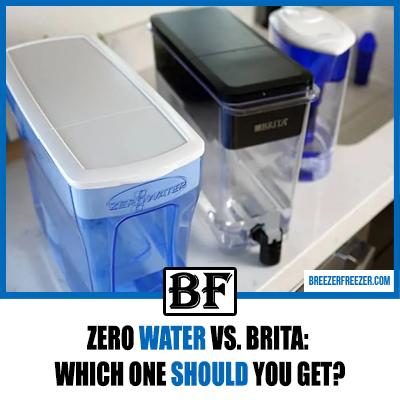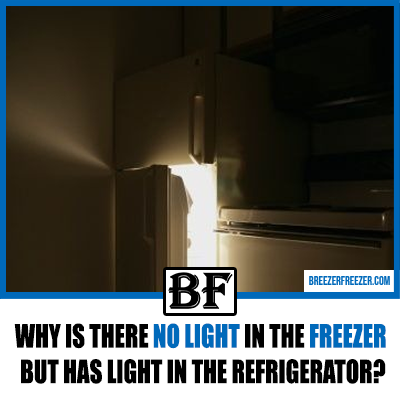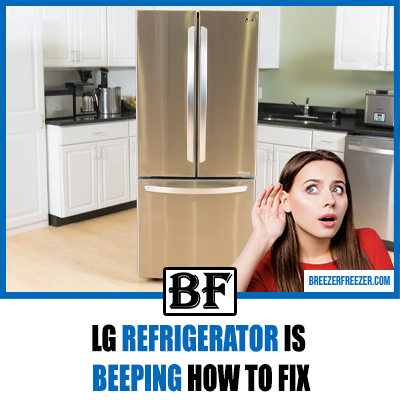Zero Water vs. Brita: Which One Should You Get?
It’s no secret that filtered water is better for you than unfiltered water.
Now, you must already know that water filtration is an important process, regardless of the type of water you’re dealing with. You may have tap water, filtered water, or bottled water, but it’s important to know what kind of contaminants the water may contain and how best to remove them.
In this article, we’ll look at two popular types of water filters – Brita Standard Everyday Water and Zero Water. Both have their own unique benefits and drawbacks, and you can learn about them in the following section.
Zero Water vs. Brita: Which One Should You Get?
We will begin by introducing both the brands and then move on to discussing the difference in features.
ZeroWater ZP-010 Water Filter Pitcher
The ZeroWater ZP-010 Water Filter Pitcher is an excellent option for those searching for a method to drink only safe water. This pitcher is made with five stages of filtration, which helps to remove lead, chlorine taste, and odor, along with other impurities from the water.
Additionally, the ZeroWater pitcher has a built-in meter that measures the TDS (total dissolved solids) of your water, and this will ensure you are getting clean water every time.
The ZeroWater pitcher is also BPA-free and comes with a 30-day money-back guarantee. Hence, if you are not satisfied with the purchase, you are free to return it and get a complete refund.
Overall, the ZeroWater ZP-010 10 Cup Water Filter Pitcher is a great choice for those who are searching for an affordable pitcher filter.
Pros
- Made with five stages of filtration, which helps to remove lead, chlorine taste, and odor
- Comfortable grip handle
- ZeroWater pitcher is BPA-free
- Comes with a 30-day money-back guarantee
Cons
- May take a lot of space on the countertop
Brita Water Pitcher
Brita is another top brand that offers a range of high-quality products. You will get faucet filters, pitchers as well as water bottles that are needed to meet daily needs.
The Brita Standard Everyday Water 10-Cup Filter Pitcher is an amazing choice for those looking for a reliable water filter. This pitcher is made with activated carbon filters, which help to remove chlorine along with other impurities.
Additionally, the Brita pitcher has a built-in indicator that tells you when it’s time to replace filters, so you can be sure to get the cleanest possible water. That is not all; the Brita filter is also BPA-free and comes with a 1-year limited warranty.
Overall, the Brita Standard Everyday Water 10-Cup Filter Pitcher is a great choice for those looking for an affordable and reliable water filter.
Pros
- Made with activated carbon filters
- Helps to remove chlorine taste and odor
- Has a built-in indicator that tells you when it’s time to replace your filters
- BPA-free
- Comes with a 1-year limited warranty
Cons
- Small and doesn’t hold as much water as other pitchers
Comparing Zero Water with Brita Filter
If you are searching for a water filter that can remove impurities quickly and efficiently, the ZeroWater ZP-010 is a great option. It has a tank capacity of 10 cups and can filter water at a rate of 6 minutes per quart. Additionally, it scored high in taste tests, with 94% of users finding it to be satisfactory. The only downside is that it’s slightly more expensive than some other options on the market.
Brita water filters are a popular choice for those looking for an affordable and efficient way to remove impurities from their water. The Brita Standard Everyday Water filter, for example, has a tank capacity of 10 cups and can filter water at a rate of 4 minutes per quart. Additionally, it scored satisfactory marks in taste tests, with 65% of users finding it to be satisfactory.
Design
The Brita Standard Water Pitcher and Zero Water ZP-010 have similar capacities, but they sport different designs.
Moving on, the Zero Water ZP-010 water filter pitcher is easy to use – even kids can pour out water without any trouble. The pitcher has a spout and a spigot, which makes it simpler to dispense water into your glass. The ergonomic handle also makes it easy to pour, regardless of your hand size.
Hence, we can say that this water filter pitcher is a great choice for families or anyone who wants an easy-to-use pitcher that dispenses water efficiently.
Another essential feature is the covered pouring spout on the water filter that ensures no impurities fall into your filtered water. This design feature is just one of the many ways that this water filter is designed to provide you with the best possible drinking experience.
Because of its standard pitcher design, the Brita Standard Everyday Water pitcher is a bit heavier than Zero Water’s pitcher, even though it has more compact dimensions. And you cannot miss out on the fact that the pitcher has the right size to fit inside any fridge door.
A major difference in design between Brita Standard Everyday Water and Zero Water is that the Brita filter comes with an electronic filter indicator, while Zero Water does not.
To make up for it, Zero Water has a water quality meter that allows users to test their water to see how many dissolved solids are present. This is useful information to have, as it allows users to know when it’s time to change the filter.
Speed Of Filtration
When it comes to water filtration system speed, Brita Standard wins over ZeroWater ZP-010. The standard filter can clean a quart of water within a short span of four minutes, while Zero Water needs two minutes more to filter the same amount of water.
However, Zero Water removes a lot more contaminants when compared to Brita, so it might be worthwhile to wait the extra few minutes to get the job done. Also, if you live in an old property where there might be lead in your water, Zero Water will be able to do a better job.
Performance
In terms of performance, both pitchers do an adequate job of filtering water. However, because Zero Water filters water more thoroughly, its filtered water tastes better than Brita’s. Additionally, Zero Water’s pitcher holds more water than Brita (2.4 gallons versus 1.8 gallons), so you don’t have to refill it as often.
Features
Zero Water’s filtration system uses a five-stage process to remove 99.9% of all dissolved solids from your water. First, a sediment filter removes large particles like dirt and sand. Then, an activated carbon filter gets rid of chlorine and other chemicals.
Next, ions are exchanged to eliminate heavy metals such as copper and lead. Finally, water is passed through a patented ultra-fine filter to remove any remaining impurities.
Zero Water’s filtration system is designed to remove all impurities from your water, including chlorine, lead, heavy metal pieces, odor, arsenic, pesticides, and herbicides. Additionally, their filters are effective at removing bacteria and particulate matter.
Brita’s filtration system also uses a multi-stage process to remove impurities from your water. A pre-filter traps larger particles like dirt and sand. Then, an activated carbon filter reduces chlorine and other chemicals. Finally, water is passed through a Brita-patented micro-filter to remove any remaining contaminants.
Also, Brita is designed to remove impurities from your water. However, the filters are not as effective at removing certain contaminants, such as chloramines, mercury, cadmium, copper, and zinc. Additionally, their filters can only remove particulate matter down to 0.5 microns in size.
Overall, Zero Water and Brita filters are effective at removing most impurities from your water. However, Zero Water’s five-stage filtration system may be more thorough in getting rid of all dissolved solids.
Test Reports
There is no doubt that as water filter pitchers, both Brita and Zero Water have surpassed our expectations.
Zero Water is a relatively new brand but has managed to win the hearts of many. This pitcher filter is highly efficient in removing contaminants, and if there are excess minerals present in the water, it removes them too. So, if you have embarked on a low-sodium diet, a Zero Water filter might be the best bet for you.
Now, let’s move on to the Brita water filter pitcher. This brand has been ruling the market for decades now, and there’s no way you will go wrong with it. From the tests that we conducted, we found that it does not filter out any essential nutrients from the water and conducts the filtration process pretty fast. So, that’s a win-win!
Apart from that, the electronic Brita filter comes with a highly-functional indicator. It’s true that this indicator does not show the amount of minerals and solids the filter has dissolved. However, it does indicate when the filter cartridge needs a replacement. For people who run a busy household, this is a great plus point as it helps test your filter condition without taking much trouble.
But, then, there are people who want to get the exact details about their water condition. If you fall into that category, we suggest that you choose Zero Water instead.
Cartridges
Whether you are buying replacement filters or buying a new water filter pitcher, it is very normal for a customer to ask, “how long is it going to last?” When making a purchase, always first try to figure out how often you will need to change the filters in your water pitcher.
Before we move on to answering whether Brita or Zero Filter scores better on this count, let us tell you that both these water filters use cartridges that are similar. So, in terms of performance, they are on equal footing. When used regularly, both the cartridges in these two different devices can filter 40 gallons of water before needing a replacement.
That said, you need to remember that ZeroWater filters remove more water impurities than Brita and clean the water more thoroughly. As a result, there’s a higher chance that the cartridges will run out of capacity well before reaching the 40-gallon mark. If that happens, you will need to make replacements sooner.
Putting it simply, the lifespan of a cartridge is directly dependent on the amount of impurities present in the water that gets filtered. Because of that, you will find some people are able to use a cartridge only for four weeks, while others can use the same cartridge for around four months.
Dispensers
There are many who prefer using a dispenser instead of a water filter. If you are one of them, you would be happy to know that the Zero Water filter pitcher has merged the filtration and dispensation process in the same container.
And to ensure that the functioning is easier, you will find a spigot located right under the handle. That makes it easier for children or people with disabilities to use it without any problem.
Unlike the Zero Water filter, the Brita option does come with a dispenser function. However, in case you have a big family, you can consider purchasing the standard dispenser that Brita offers. This dispenser makes use of the same filter that is found in all standard Brita water pitchers but has a capacity of 18 cups.
In case you are hell-bent on purchasing a Zero Water device but want a higher filtration capacity, you can go for the countertop dispenser that this company makes. This dispenser comes with an 18-cup capacity.
Bottom line, Brita’s dispenser is more cost-effective than the pitcher it makes. And the Zero Water dispenser is better equipped to filter more water impurities.
User’s Opinions And Complaints
When it comes to water filter pitchers, the Zero Water pitcher is a popular option. It features a built-in spigot, which makes it easy to use as a dispenser. That is not all; most users appreciate its lightweight design and have mentioned that in their reviews. Thus, making it a good choice for van life, excursions, or camping.
However, the main complaint about this pitcher is the short lifespan of its filters. Although advertised to be able to filter up to 40 gallons of water, many users find that they need to replace the filter a lot sooner than that.
In fact, some users report having to replace the filter after only two weeks of use. This can make the cost of ownership quite high over time, and a lot of average homeowners may not be able to afford it.
Another downside of the Zero Water pitcher, according to some users, is that it doesn’t remove all impurities from the water. While it may reduce the amount of chlorine and other chemicals in the water, it may not completely remove them.
Brita Vs. Zero Water: Frequently Asked Questions
1. What does a water filter pitcher do?
A water pitcher is usually made of plastic or glass and has a built-in filter that removes impurities from the water as it passes through. It filters water, and this filtered water can then be used for drinking, cooking, or other purposes.
Pitchers with filters are an inexpensive and easy way to improve your water quality at home. They can remove many common contaminants, such as chlorine, lead, and bacteria. Some pitchers even come with additional features, such as a built-in ionizer that can help reduce the taste and odor of your water.
If you are searching for an easy way to improve the quality of your water, a water filter pitcher is a great option. Be sure to choose a pitcher certified by an independent testing organization to ensure that it performs as advertised.
2. Can Brita filter eliminate fluoride?
While it is certainly true that fluoride can have some benefits for dental health, it is also essential to be aware of the potential risks associated with excess fluoride exposure.
Too much fluoride can lead to several serious health problems, including kidney issues, debilitating bone disease, hyperthyroidism, cognitive impairment, osteoporosis, depression, and cancer. If you are concerned about fluoride intake, be sure to talk to a doctor or dentist to ensure that you are taking the appropriate precautions.
Yes, Brita filters are able to remove fluoride from water. This is beneficial for those looking to reduce their exposure to this chemical, which has been linked to various health concerns.
Although Brita filters will not completely remove all fluoride from water, they can significantly reduce the amount that is present.
It is important to note that Brita filters should not be trusted as the only method of fluoride removal. If possible, obtaining water from a source that does not add fluoride to its water supply is best. This will ensure that you are not exposing yourself to unnecessary levels of this chemical.
3. Is using Brita healthy?
When it comes to finding the best water filter for drinking water, there are a few things you will need to remember.
First of all, make sure that the water filter is made from BPA-free materials. This is important because BPA can be harmful to your health. Second, you’ll want to find a pitcher that is easy to use and clean. And finally, you’ll want to find a pitcher that can provide you with great-tasting filtered water.
Brita filter meets all of these criteria. This pitcher comes with everything you need to get started, including filters for up to four months of use. The Brita UltraMax also features an easy-to-use dispenser, so you can get filtered water with the push of a button. Plus, the pitcher is made from durable BPA-free materials, so you can be sure that it’s safe for your family and kids to use.
4. What are the drawbacks of Brita?
One of the main drawbacks of Brita is the cost of replacement filters. Because each filter only lasts for around two months, it can become expensive if you drink a lot of water or want clean cooking water at all times. Another drawback is that the filter indicators are not always accurate.
This can make it difficult to know when to change the filter. However, by keeping track of how much water was filtered or the date you installed the filter, you should be able to know when it needs to be replaced.
Moving on, the filter has a lower capacity to eliminate fluoride from tap water. People who prefer a pitcher that can easily remove fluoride may not find this worthwhile.
Finally, because the filters are prone to spilling, you need to be careful when pouring water from the pitcher into glasses or other containers. Otherwise, you could end up making a mess.
5. Can Zero Water filters eliminate fluoride?
As mentioned by the manufacturer, this pitcher can eliminate up to 99% of the fluoride as well as some other chemicals, heavy metals, and organic contaminants. So, if you are searching for a method to improve tap water quality, a Zero Water pitcher is worth considering.
6. What are the drawbacks of Zero Water?
A major drawback of Zero Water is its slow filtration speed. In comparison to other water filter pitchers on the market, Zero Water takes significantly longer to filter water. This can be frustrating if you’re in a hurry or need a lot of filtered water at once. Additionally, because Zero Water filters so slowly, it can’t keep up with high demand and will eventually need to be replaced more frequently than other brands.
7. Which one is better for the environment?
Both Brita and Zero water filters are effective at removing contaminants from water. However, Zero water filters may be better for the environment because they use a five-stage filtration system to remove impurities. This feature can be more effective at removing certain types of contaminants than the activated carbon used by Brita filters.
Moving on, when you’re done with your Brita pitcher, dispenser, bottle, or any of the other products it offers, don’t just toss it in the trash. Brita has a recycling program that will help in getting rid of your old product and might even earn you some rewards.
To recycle your Brita product, visit the recycling page on the Brita website. Complete the form on the page, and they will provide you with a free shipping label. Make sure that any waste in the Brita product is dry before you pack it in a box and mail it to the designated address. They will then take care of the rest.
8. What type of filter is used in the ZeroWater 5-Stage Filter?
The ZeroWater 5-Stage Filter uses an ion exchange filter. This type of filter is known to remove 99.6% of all dissolved solids from water, making it an effective way to filter water. Brita filters use a granulated activated carbon filter.
This type of filter removes impurities by adsorbing them onto the surface of the carbon particles. While both types of filters are effective at removing impurities from water, the ZeroWater 5-Stage Filter is more effective at removing dissolved solids.
You can also sign up for the auto delivery filter program that is provided by the brand. Pick a pack size and opt for your monthly delivery option. You can then get the filters shipped on a preferred date every month. In case you do not need it in a certain month, just talk to customer care representatives, and you can skip it for a month.
9. Are the filters certified?
Yes, ZeroWater’s 5-stage filter is certified by NSF International to remove 99.6% of all dissolved solids from water. This means that it can effectively remove lead, chromium, and other contaminants that may be present in your water supply.
Brita’s filters are also certified by NSF International to reduce chlorine taste and odor, as well as select VOCs (volatile organic compounds). However, they are not specifically certified to remove dissolved solids like ZeroWater’s filters are.
If you are searching for a water filter that can remove the widest range of contaminants possible, ZeroWater’s 5-stage filter is the way to go.
Final Words
So, which pitcher is right for you? Ultimately, it comes to personal preference after you know about all the qualities. If you want a pitcher that is more affordable and you live in a place that receives treated water, then Brita Standard Everyday Water is a good choice.
On the other hand, if you live in an old building with rusted pipelines, the contamination level of the water can be high, and Zero Water is a better option. Also, the same applies if you live in an area where you may be getting only contaminated water.
And remember, whichever option you pick, get the water quality checked so that you can always have access to clean and safe drinking water.
That said, it’s a wrap. Stay tuned for more informational articles. Until then, stay hydrated!





